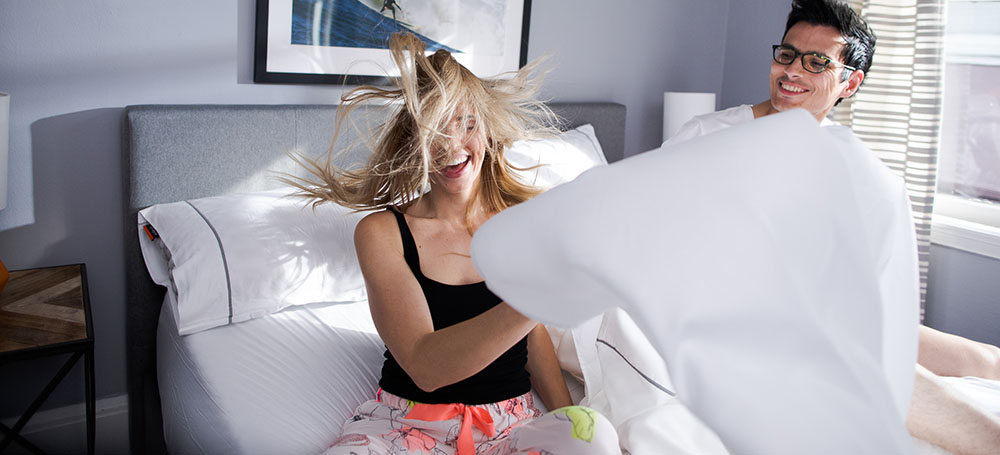But is there more to night owls vs. early birds than meets the eye? Yes—and that’s what we’re going to uncover. To help you understand the differences between a night owl vs. early bird, along with the health implications and pros and cons of each, we’ve created this all-encompassing guide. Read through for a detailed explanation of early birds and night owls, or navigate the post using the links below.
- What Is a Night Owl vs. Early Bird?
- What Causes Sleep Patterns?
- Pros and Cons of Being a Night Owl
- Pros and Cons of Being an Early Bird
- Which One Is Better?
- How to Change Your Sleep Pattern
- Wrapping Up: Night Owls vs. Early Birds
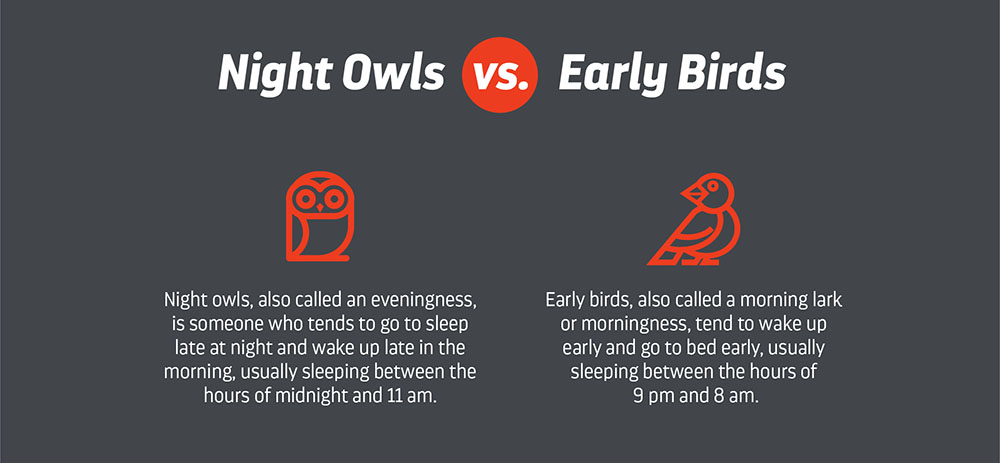
What Is a Night Owl vs. Early Bird?
The debate between early birds and night owls is a long one, but what are they? A night owl, also called an eveningness, is someone who tends to go to sleep late at night and wake up late in the morning, usually sleeping between the hours of midnight and 11 am. Early birds, also called a morning lark or morningness, tend to wake up early and go to bed early, usually sleeping between the hours of 9 pm and 8 am. By now, you probably know what sleep cycle you prefer. You’ve probably also heard that early birds are “healthy, wealthy, and wise,” while night owls are unproductive and unhealthier.
But how true is this? Being a night owl or early bird isn’t just a personal preference, it’s actually genetically predetermined and written in your DNA. That makes the battle over bedtime a tough one to call. To better understand what causes early birds to rise with the sun and night owls to dance in the moonlight, let’s unpack what causes sleep patterns in the next section.
What Causes Sleep Patterns?
By now, you’re probably asking yourself one question: why? Why can’t I stay up past 9 pm and watch my favorite late-night comedy show? Or why is waking up at 6 am the bane of my existence? This has to do with something called your internal biological clock, also called your circadian rhythm or chronotype.
Your circadian rhythm is the 24-hour clock your body runs on and is influenced by the Earth’s 24-hour light/dark cycle. The circadian rhythm regulates not only your sleeping pattern, but also your hunger and eating patterns, your body’s hormone levels, and even your mood. However, when it comes to sleep, your internal clock is heavily influenced by external factors, such as sunlight and temperature, which dictate when you begin to feel sleepy and awake throughout the day. Some sleepers have a longer natural wake-sleep cycle, which can make them night owls. Those with shorter natural wake-sleep cycles are often early birds.
But your body’s circadian rhythm isn’t the only factor that determines whether you’re an early riser or nighthawk—we have to go way back to the Paleolithic Eras. As we’ve alluded to, your sleep schedule is also genetically predetermined and written in the code found inside your DNA, thanks to evolution. In the Paleolithic Eras, hunter-gatherers had to keep their groups protected throughout the day and night. So, some members would spend the daylight hours awake, while others would stay up during the night to fend off any suspecting threats and predators. Over time, the genes of these two types of group members were passed down, resulting in early birds and night owls.
Today, the traditions of our ancient ancestors are long gone. Instead, most of us are now accustomed to the traditional 9 to 5 workday. While this isn’t a problem for most early birds, it can be disruptive to natural night owls. This is because night owls experience something called social jetlag. Social jetlag is the sleep deprivation people experience trying to acclimate to social norms, such as the 9 to 5 workday or traditional school schedules. For night owls, it can feel as if they’re waking up in a different time zone every morning because they tend to go to bed late at night while being forced to wake up early in the morning, resulting in sleep deprivation.
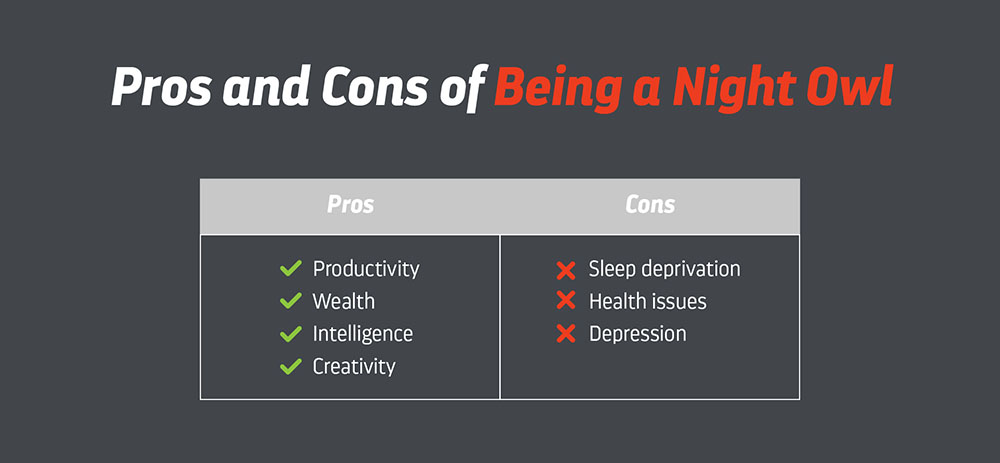
Pros and Cons of Being a Night Owl
While it might seem night owls have the short end of the stick, that’s not entirely true. There are many pros to being a night owl, along with some cons that you should be aware of. Let’s dissect them below:
Pros of Being a Night Owl
- Productivity: While night owls and early birds are both productive during their respective peak hours, night owls tend to be more productive, especially at night.
- Wealth: Overall, night owls tend to be wealthier than morning birds, earning a higher salary and having greater access to a car.
- Intelligence: Ben Franklin might not have been spot on when he said, “early to bed and early to rise makes a man healthy, wealthy, and wise.” A study by the London School of Economics and Political Science found that night owls were more intelligent than early risers, scoring higher on IQ tests.
- Creativity: Night owls also tend to be more creative than early birds. Most artists, musicians, inventors, and poets tend to prefer late nights over early mornings
Cons of Being a Night Owl
- Sleep deprivation: As we noted, night owls are often subject to social jetlag due to the standard 9 to 5 work schedule society expects them to follow. Because of this, night owls tend to become sleep-deprived, which can result in a wide range of health issues.
- Health issues: Recent studies have found night owls to be more prone to health issues, such as diabetes, neurological and psychological disorders, and obesity. They are also less active during the day than early birds, which can explain some of the correlations to these health issues.
- Depression: On average, night owls are more prone to depression than early risers, along with other mood disorders, due to social jetlag.
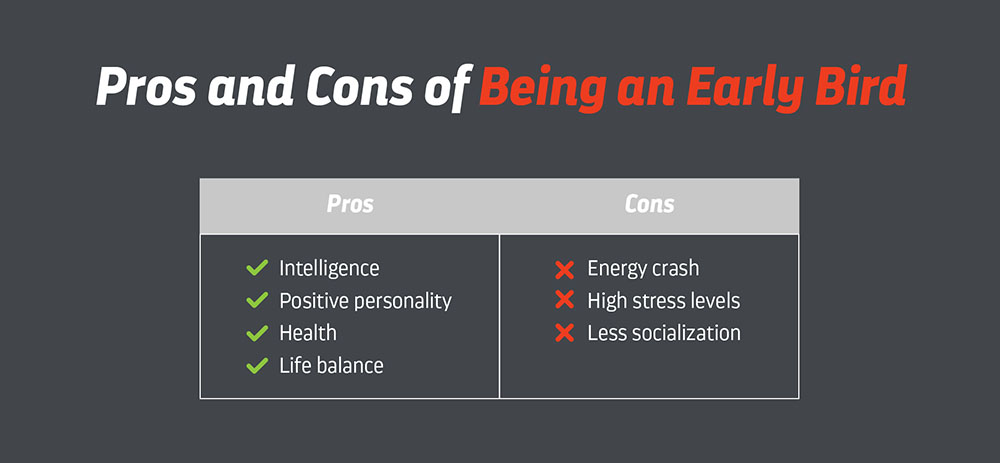
Pros and Cons of Being an Early Bird
Similar to night owls, being an early bird comes with its own set of advantages and disadvantages. If you self-identify as an early riser, take note of these pros and cons of being an early bird:
Pros of Being an Early Bird
- Intelligence: While studies have found night owls to have higher IQs, early birds don’t completely lack in the intelligence category. In fact, studies have found that early birds have higher GPAs than night owls, scoring a point higher than their counterparts.
- Positive personality: Overall, early birds are known for their positive personality traits, such as higher persistence and cooperation, more conscientiousness, and the ability to agree more often than night owls. Early birds also tend to be happier with life compared to night owls.
- Health: Ben Franklin was right when he said early birds were healthier, for the most part. Early bird vs. night owl health is much different. Early birds are more likely to exercise during the day, get better quality sleep, and have fewer health implications. They’re also less likely to be addicted to alcohol, food, and nicotine.
- Life balance: Because early birds wake up early, they usually find it easier to adjust to societal norms. As a result, they’re more likely to balance daily responsibilities, such as working a 9 to 5 job and spending time with family, without feeling the side effects of social jetlag night owls experience.
Cons of Being an Early Bird
- Energy crash: Whereas night owls get a second burst of energy in the later hours of the day, early birds tend to lose productivity and energy as the day goes on without getting a natural energy boost to keep them going.
- Higher stress levels: Compared to night owls, early birds tend to have higher levels of stress hormones, which can result in health issues like migraines, anxiety, and depression.
- Less socialization: Because early birds are wired to begin feeling tired earlier during the night, they may have a more difficult time in their social sphere. Rather than spending late nights out at the bar or other events, early birds would much rather catch some shuteye to feel well-rested.
Which One Is Better?
The early bird gets the worm, but the second mouse gets the cheese. So which is better—an early bird or a night owl? This has been a long contested-debate, and the answer isn’t necessarily clear. Now that you have a better understanding of your chronotype, you can tell that both night owls and early birds have their own set of unique advantages and disadvantages.
As for who won, the answer is a 50/50 split. More researchers are finding that your genes dictate sleep patterns, and going against your body’s demands, such as a night owl trying to become an early bird, can do more harm than good. However, that doesn’t mean you can’t make the switch. Let’s look at how you can change your sleep pattern in the next section.
How to Change Your Sleep Pattern
Changing your sleep pattern won’t happen overnight. And as we’ve alluded to, shifting your sleep pattern might not always benefit you. However, in most cases, night owls have to conform to societal norms and learn how to wake up early. Fortunately, if you’re a night owl trying to become a morning person, there are ways you can change your sleeping pattern.
Sleep training can be done in many ways. To get better sleep and become an early bird, consider these tips:
- Exercise during the day
- Avoid stimulants like coffee, chocolate, and energy drinks
- Avoid nicotine
- Reduce your screen time before bed
- Set your room to the right temperature, ideally around 65 degrees
- Commit to a fixed sleep and wake up time
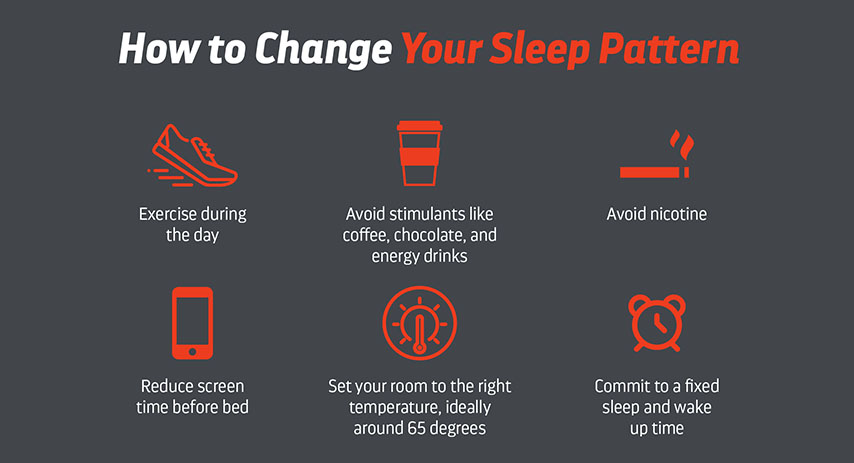
In addition to these sleep training tips, investing in better bedding can help you catch some much-needed Zzz’s. Layla Sleep’s weighted blanket can be your perfect bedtime companion, as it uses Deep Touch Pressure to provide gentle pressure across your body. The result? A soothing sensation that alleviates feelings of restlessness, so you can get deeper and longer sleep.
Wrapping Up: Night Owls vs. Early Birds
The feud between whether night owls vs. early birds reign supreme has been debated for centuries. While each claim to have a better sleep pattern, more research shows that when we rise and when we sleep is genetically predisposed. This means you shouldn’t feel ashamed if you love sleeping well past 11 am or prefer hitting the hay at 9 pm instead of going to the clubs.
However, based on society’s standards, night owls tend to have the shorter end of the stick, especially if they have to wake early for a traditional 9 to 5 job. To ensure you get the best sleep possible, it’s important to understand your sleeping tendencies to build a schedule that accommodates them. You can start by finding the perfect mattress that you dream about all day and can’t wait to sleep in every night.



